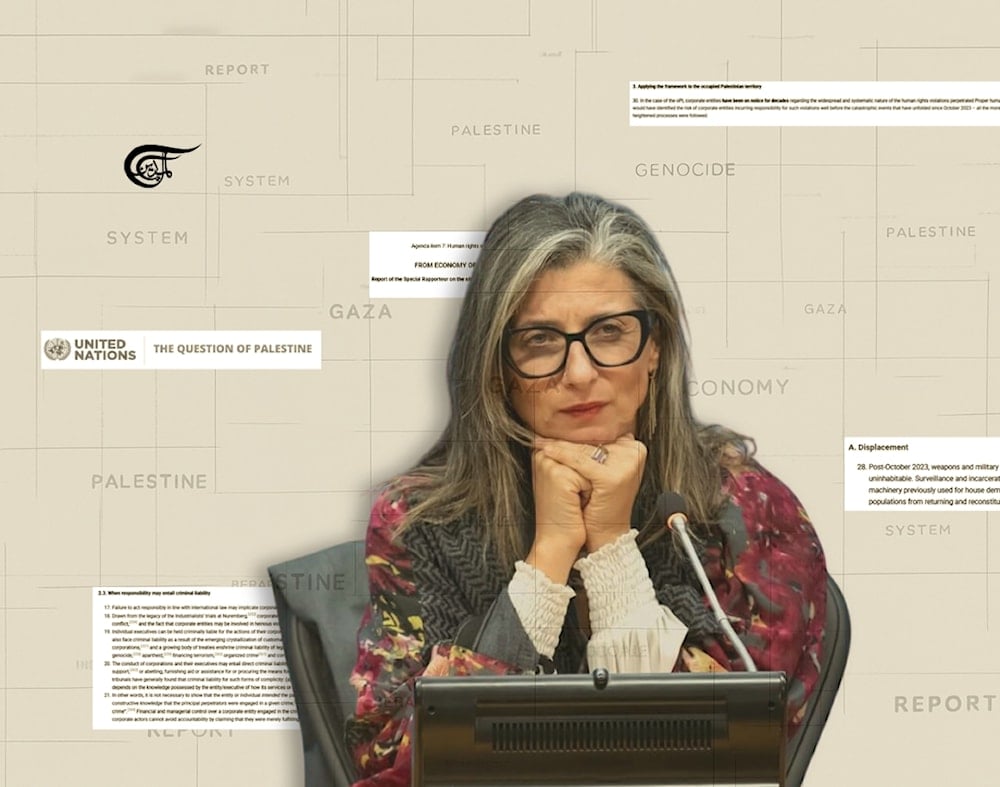Economy of Genocide: Albanese's report accuses, but doesn't dismantle system
Pasquale Liguori critiques Francesca Albanese’s UN report, noting that while it powerfully indicts Israel’s “economy of genocide” and Western complicity, it remains trapped within the very international legal order that sustains colonialism.
-

Palestine will not be liberated by UN reports, but by pursuing a different strategic horizon: one that does not beg for recognition. (Al Mayadeen English; Illustrated by Batoul Chamas)
Some have already called it a historic document - and perhaps, rightly so. The report presented by Special Rapporteur Francesca Albanese to the UN Human Rights Council, titled From Economy of Occupation to Economy of Genocide, is undoubtedly an indictment: it names, documents, exposes.
"Israel" is not merely an occupying power or an "apartheid state" - it is the agent of an ongoing genocide. And what enables this genocide is not only military and political power, but a global economic system that has turned Palestine into a laboratory of profit, military technology, and repressive innovation. The Special Rapporteur on the Occupied Palestinian Territories since 1967 dares to name not only the crimes but the accomplices. Presumably, it is for these very reasons that Francesca Albanese has been subjected to personal sanctions by the US administration - an event symptomatic of the reactive convulsions of dynamics entirely internal to a Western system in moral and political decline.
The report lists banks, tech companies, extractive industries, universities, pension funds, major industrial groups, and logistical infrastructures. From the F-35 supply chain - produced by Lockheed Martin with components from multiple countries - to artificial intelligence used in targeted killings, to biometric surveillance systems and funds that support settlements and demolitions, the genocidal apparatus stands on a transnational economy bearing the most familiar names of contemporary capitalism. "Israel" is not acting alone. And the West’s hands are drenched in blood.
This report’s strength lies in how it institutionalizes and amplifies what Palestinian-led boycott campaigns have denounced for over two decades: the active complicity of a multitude of multinational corporations in the colonial project and the systematic oppression of the Palestinian people. Its analytical value stems from its capacity to build on an expansive body of prior research and investigations - especially since the neoliberal turn following the Oslo Accords - by academics and activists, both Palestinian and international, who have exposed the capitalist interests underpinning colonization in all its forms.
It is no coincidence that the most vicious reaction came from the United States. The letter signed by U.S. Ambassador to the UN Dorothy C. Shea, demanding Albanese’s immediate removal and accusing her of antisemitism, terrorism, and threats against American businesses, constitutes a grave act of diplomatic intimidation - unacceptable in any multilateral setting. Its aim is not merely to silence a troublesome voice, but to deter anyone else from pursuing the same path: that of truth-telling about "Israel’s" systemic crimes and the global complicities that guarantee its impunity. This call for censorship – later followed by direct sanctions against her imposed by the U.S. government - is the Pavlovian reflex of an empire intolerant of any fracture in its narrative.
Yet, while recognizing the strength of this report, we must also confront its limits - not incidental, but structural.
The entire framework of the report is built within the architecture of international law, accountability mechanisms, and recommendations to states. This exposes it to an inherent contradiction: legitimizing the very political, legal, and discursive order that is a direct expression of global capitalism and its market dynamics. Framing a critique of profit within the regulatory boundaries of international law results in a paradox: it preserves the very structural logics that enable accumulation, while merely targeting its most visible and immediate manifestations - reduced to a purely economic dimension, abstracted from the systemic context that produces and sustains them. Palestine is the paradigmatic space where law has become the disguise for its own suspension - where every resolution is ignored, every crime unpunished, every indictment archived. The illusion that legal truth alone can halt oppression is itself part of the machinery that reproduces powerlessness.
There was a time when Special Rapporteurs’ reports were seen as cracks in the legal and political conscience of the West. They were read, supported, and disseminated. But over time - and even more so after October 7 - that trust has yielded to critical reappraisal, not from disillusionment, but from a mature awareness: international law is not just impotent; it is structurally functional to the preservation of colonial order.
Albanese’s report denounces the economy of genocide but continues to place faith in a legal infrastructure that is both constitutive of and dependent upon the colonial project. This persistent reference to international law - unless accompanied by a critique of its origins and function - ends up legitimizing a normative order historically designed to support and rationalize colonialism. Modern international law, born in the context of European imperial expansion, is not a neutral field but an ideological and juridical apparatus of global governance, meant to preserve unequal power relations. Its claim to universality masks a specific function: to protect the status quo and ensure conditions for market expansion - even by legalizing colonial violence.
Even the very mandate of the Special Rapporteur is limited to territories occupied after 1967. This means that the Palestinian right to land is recognized only within the pre–Six Day War borders, thereby implying tacit acceptance of the legitimacy of the "State of Israel." The events of 1948 are effectively relegated to a merely historical dimension. Thus, genocide is acknowledged today, but the original trauma of the Palestinian people remains outside the scope of legal competence.
Ultimately, this report - despite its radical tone - does not destabilize the ideological foundations of the system it aims to indict. Israeli colonialism is portrayed as an exceptional deviation rather than a coherent manifestation of a global model in which capitalist accumulation demands colonial frontiers to uphold, peoples to dispossess, and territories to exploit. The economy of genocide is an intrinsic feature of global capitalism - not its pathological deviation.
In this sense, the report ends up serving the international system itself: a kind of self-absolution by the UN, allowing space for dissenting analyses. But it is a device of truth defused by the architecture of Western impunity. Authoritative, well-documented - and most likely, destined to be ignored. Because today, there is no institution willing or able to act against Israel. The West has chosen genocide as its historical throughline. And international law stands naked. This does not diminish the work of those who authored these pages. But it compels us, the readers, to grasp their meaning and push further. To move beyond legalist indignation. To shatter not only impunity, but also the illusion.
To go further means recognizing that Palestinian liberation cannot occur within the interpretive frameworks of international legality, nor through a moral reformation of the global economy. It requires an understanding that capitalism, colonialism, and law are not separate realities, but interdependent pillars of a single world order. An order that does not produce death, dispossession, and impunity by accident or dysfunction - but by deliberate, organic political design. The struggle for Palestine is, therefore, also a struggle against market ideology, against the naturalization of colonial private property, against the subordination of life to profit.
Palestine will not be liberated by UN reports, but by pursuing a different strategic horizon: one that does not beg for recognition, that refuses to be viewed through the lens of pity or humanitarian trauma, and instead asserts political centrality. A horizon that doesn’t seek a seat at the negotiating table - but exposes the table itself as a colonial construct, one that speaks the language of restitution, not coexistence; of self-determination, not mediation. A horizon that rejects the idea that liberation must pass through Western permission. A vision of Palestine not as an object to be saved, but as a subject capable of rewriting its own history - and perhaps, ours as well.

 Pasquale Liguori
Pasquale Liguori
 7 Min Read
7 Min Read









